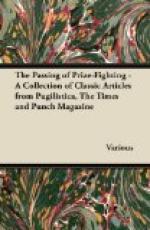Wednesday, June 6th.—Nothing short of a revolution, it was supposed, would cause Whitehall to empty its precious pigeon-holes, in which so many millions of pious aspirations and abortive complaints sleep their last sleep. But the War has penetrated even here, and Mr. BALDWIN was able to announce, with a cheerfulness that some of the older officials probably regard as almost indecent, that already a vast quantity of material has gone to the pulping-mill.
[Illustration: Mr. WINSTON CHURCHILL (with eye on the Air Board). “ANY UNIFORM SUITS ME, THANK YOU.”]
In the course of the debate on the Representation of the People Bill, Sir FREDERICK BANBURY explained that he resigned his membership of the SPEAKER’S Conference because he found that he and his party were expected to give up everything and to get nothing in return. If so the Liberals on the Conference were very short-sighted, for a little concession then would have saved them a lot of trouble now. What Sir FREDERICK does not know about the art of Parliamentary obstruction is not worth knowing, and he evidently means to use his knowledge for all it is worth. He even succeeded—a rare triumph—in drafting an instruction to the Committee which passed the SPEAKER’S scrutiny and took a good hour to debate. In vain Sir GEORGE CAVE and Mr. LONG reminded the House that it had already approved the main principles of the Bill. You can’t ride a cock-horse when BANBURY’S cross.
Another old hand at the game is Lord HUGH CECIL. His particular grievance against the Bill is, I fancy, that it alters the character of his constituency, and, should it pass, will oblige him to appeal for the votes of callow young Bachelors with horrid Radical notions instead of being able to repose in confidence upon the support of a solid phalanx of clerical M.A.’s. He possesses also an hereditary antipathy to extensions of the franchise. Lord CLAUD HAMILTON must have thought himself back in 1867, listening to Lord CRANBORNE attacking the Reform Bill wherewith DIZZY dished the Whigs. Lord HUGH, like his father, is a master of gibes and flouts and jeers, and used most of the weapons from a well-stocked armoury in an endeavour to drill a fatal hole in the Bill.
At one moment he chaffed the HOME SECRETARY for seeking to turn the House into a Trappist monastery, where Ministers alone might talk and Members must obey; at the next he was reminding the House, on a proposal to raise the age of voters, that a great many of the persons who took part in the massacre of St. Bartholomew were under twenty-two years of age. But though Members listened and laughed they refused, for the most part, to vote with him. The Bill came almost unscathed through the first day of its ordeal in Committee.
Thursday, June 7th.—If all the hundred and sixty-eight Questions on the Order Paper had been fully answered the German Government would have learned quite a number of things that it is most anxious to know, for the Pacifist group were full of curiosity regarding the war-aims of the Allies. Several of the most searching inquiries had to be met by such discouraging formulae as “I have nothing to add to my previous reply,” or “The matter is still under consideration.”




